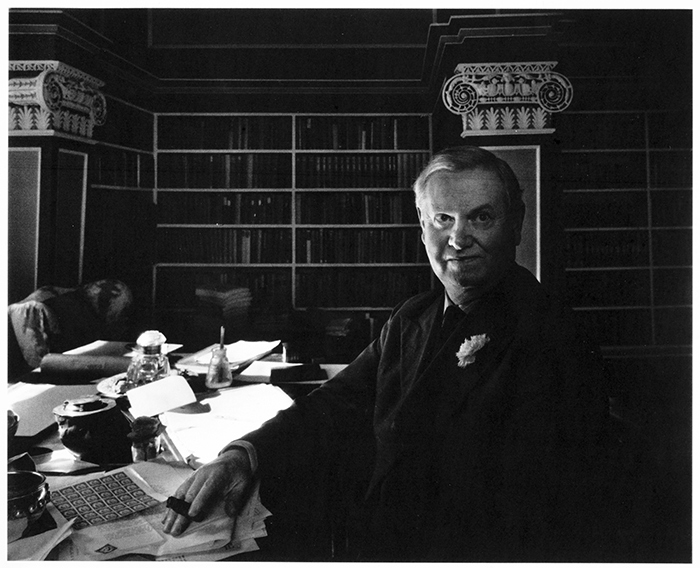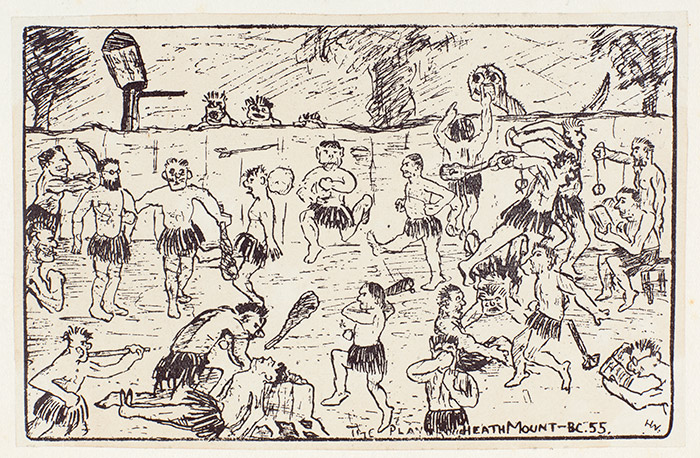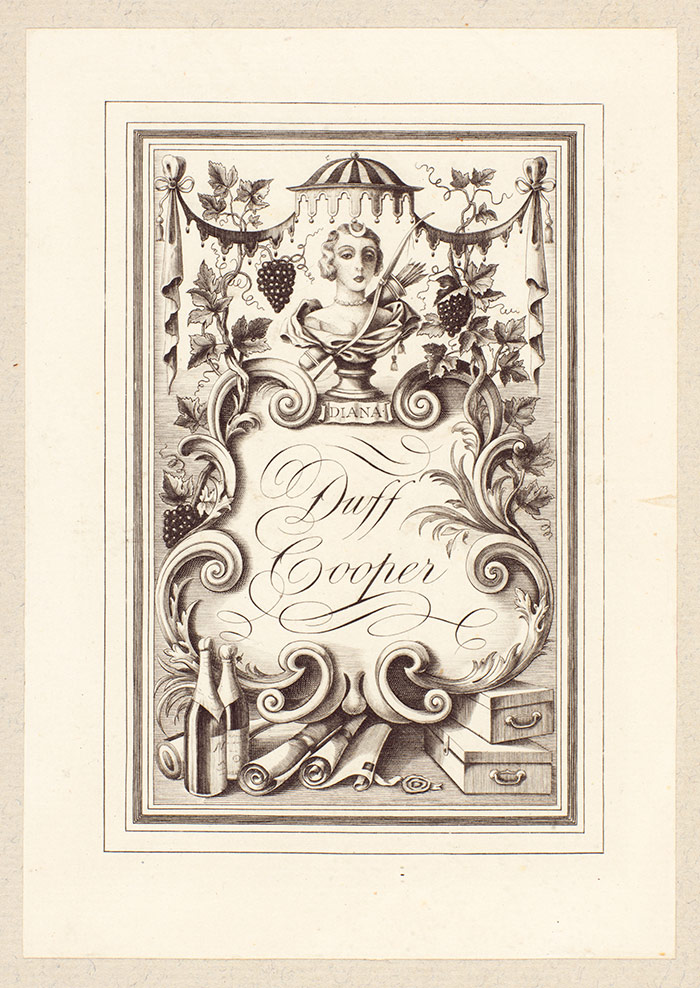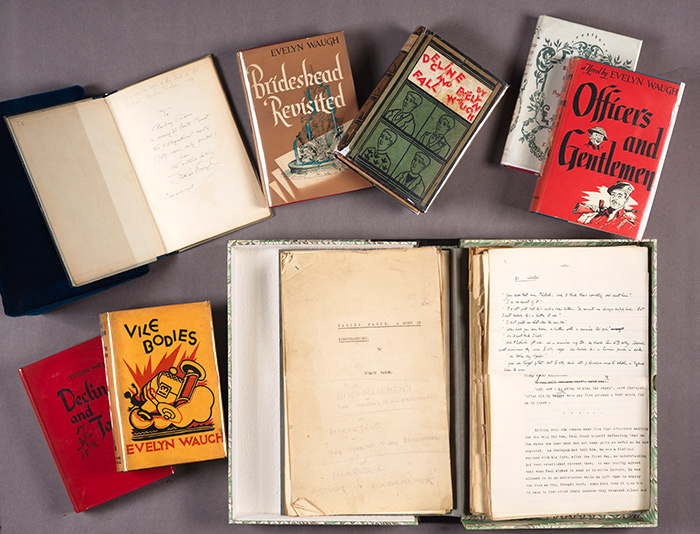The Huntington’s blog takes you behind the scenes for a scholarly view of the collections.
Evelyn Waugh as Reader, Writer, Collector
Posted on Wed., May 3, 2017 by and

Evelyn Waugh, pictured here around 1950, loved books as literature and beautiful objects. Photographic print from the Evelyn Waugh Papers. The Huntington Library, Art Collections, and Botanical Gardens.
Early in his life, the celebrated British writer Evelyn Waugh (1903–1966) thought he’d make furniture for a living; he also studied art. While he ultimately abandoned those paths, his desire to make beautiful things never ceased. Loren and Frances Rothschild’s 2013 gift of their Evelyn Waugh collection made The Huntington the home of many of those beautiful objects. Waugh’s books are works of art beyond the quality of the sentences they contain. He devoted tremendous effort to polish his prose, but he also took great care with the production of finely bound autograph manuscripts and gift editions of his books.
During Waugh’s lifetime, and even in the years following his death, it was easy for his personality to eclipse the importance and pleasure of his writing. That began to change with the remarkable television adaptation of Brideshead Revisited in 1981, when a consensus emerged, acknowledging the elegant craft on display in virtually every bit of work he created without denying the frequently prickly nature of his behavior.

Naomi Milthorpe, a presenter at the Waugh conference, has been studying Waugh’s juvenilia at The Huntington, including “Heath Mount BC 55,” a humorous depiction of Heath Mount School in Hampstead, England, as it might have appeared in ancient times. Waugh attended the school from the age of 10 to 14. Illustration by Waugh and Hooper, 1916, Evelyn Waugh Papers. The Huntington Library, Art Collections, and Botanical Gardens.
Waugh’s appreciation for the book as object and as literary art is the inspiration behind the conference “Evelyn Waugh: Reader, Writer, Collector,” taking place on May 5 and 6 in Rothenberg Hall. The Rothschilds’ gift—which includes 250 rare books and reference books and 135 letters and manuscripts by the author—is the catalyst for the conference, a collaboration between The Huntington, the Evelyn Waugh Society, and the UK-based Complete Works of Evelyn Waugh project.
Members of The Complete Works of Evelyn Waugh project are working with Oxford University Press to produce a 43-volume scholarly edition of all Waugh’s works, with the first volumes scheduled to appear in the months following the conference. Many of the project’s editors are also members of The Evelyn Waugh Society, which was established in 2008 and produces Evelyn Waugh Studies , a peer-reviewed quarterly journal.

Duff Cooper bookplate pasted inside the autograph draft of Waugh’s travelogue Ninety-Two Days, Evelyn Waugh Papers. The Huntington Library, Art Collections, and Botanical Gardens.
Both groups have lost no time in exploring The Huntington’s new holdings: Naomi Milthorpe, a 2015–16 short-term Andrew W. Mellon Foundation Fellow at The Huntington, has already incorporated her findings into a book, Evelyn Waugh’s Satire: Texts and Contexts, while Douglas Lane Patey, Sophia Smith Professor of English Language and Literature at Smith College, has been studying the manuscript of Waugh’s Ninety-Two Daysfor his new edition of the travelogue. Both will be presenting at our conference, along with leading Waugh biographers, archivists, and editors.
Together, we will be exploring the concept of editing as an act of collection (gathering materials and collating across continents) and investigating what Waugh’s own collections of fine books and paintings can tell us about his life and work. The participation of archivists and one speaker who was present when the first of Waugh’s possessions made it to the United States will encourage us to reflect on the role institutions play in maintaining, interpreting, and promoting collections.
Waugh’s popularity continues to rise, both as a subject of study and as a first-class literary writer and entertainer. The Waugh Society and the Complete Works project members are thrilled to partner with The Huntington as we celebrate the Rothschilds’ gift and the access it gives scholars to Evelyn Waugh’s world.

Books from the Evelyn Waugh Papers, with Waugh’s autograph manuscript of his travelogue Ninety-Two Days at bottom right. The Huntington Library, Art Collections, and Botanical Gardens.
You can read more about the conference program and registration on The Huntington’s website.
In conjunction with the conference, The Huntington will display, in the East Foyer of the Library’s Main Exhibition Hall, two items from the Rothschilds’ gift to the Library.
The autograph manuscript of Ninety-two Days, with its slipcase, will be on view. This is Waugh’s 1933 account of his travel to Guyana and Brazil. Also on display will be the corrected typescript of Waugh’s first novel, Decline and Fall (1928), a satire of the honor codes of the British gentleman, the culture of Oxford, and the foibles of upper-class society.
Chip Long, associate professor of International and European Studies at Portland State University, is editing a new edition of Waugh’s Life of Right Reverend Ronald Knox (1959) and is chairman of the Evelyn Waugh Society.
Barbara Cooke is research associate for the Complete Works of Evelyn Waugh project at the University of Leicester and is co-editing Waugh’s autobiography, A Little Learning (1964).